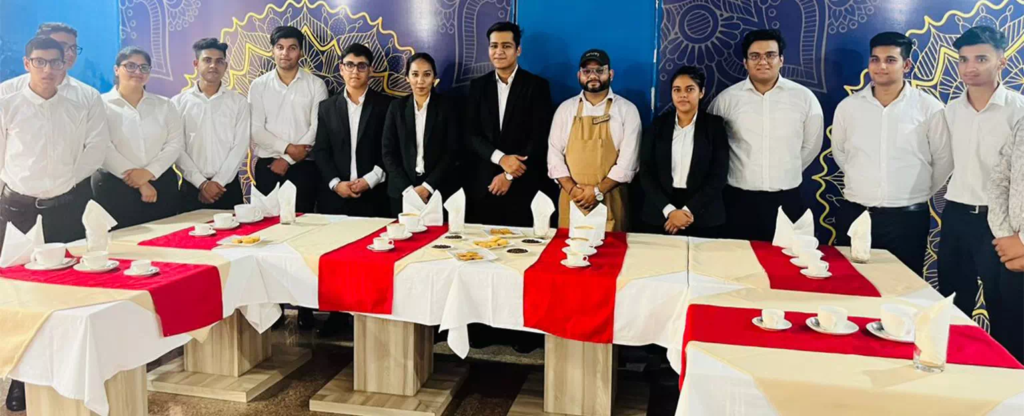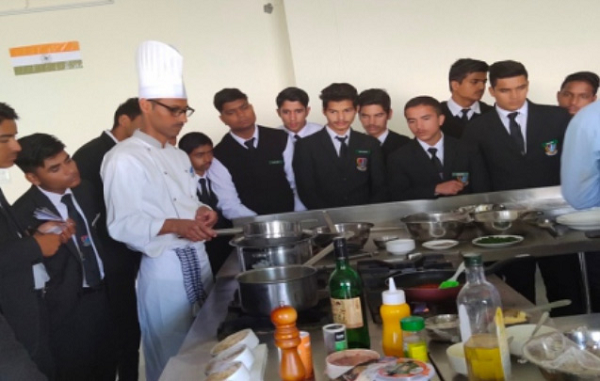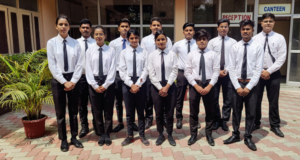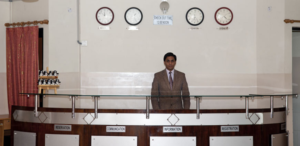BHMCT 1st years syllabus- The syllabus for Bachelor of Hotel Management and Catering Technology (BHMCT) can vary depending on the university or institution offering the program. However, I can provide you with a general overview of the subjects and topics commonly included in the first year syllabus of a BHMCT program:
- Introduction to Hospitality Industry:
- Overview of the hospitality industry
- Types of hospitality establishments (hotels, restaurants, resorts, etc.)
- Organizational structure and functions
- Front Office Operations:
- Introduction to front office management
- Reservation systems
- Guest check-in and check-out procedures
- Handling guest complaints
- Introduction to Property Management Systems (PMS)
- Food Production (Kitchen Operations):
- Introduction to culinary arts
- Basic kitchen equipment and tools
- Food safety and hygiene
- Introduction to different cuisines
- Knife skills and basic cooking techniques
- Food and Beverage Service:
- Types of food and beverage service
- Table setup and service techniques
- Menu types and planning
- Introduction to wines and beverages
- Housekeeping Operations:
- Basics of housekeeping
- Cleaning procedures and techniques
- Linen and laundry management
- Guest room cleaning and maintenance
- Communication Skills:
- Verbal and non-verbal communication
- Effective listening skills
- Written communication skills
- Customer interaction and service communication
- Fundamentals of Accounting:
- Introduction to accounting principles
- Basics of financial statements
- Recording transactions
- Inventory management
- Basic Computer Applications:
- Introduction to computer systems
- Microsoft Office applications (Word, Excel, PowerPoint)
- Internet and email usage
- Principles of Management:
- Introduction to management concepts
- Functions of management (planning, organizing, leading, controlling)
- Organizational behavior
- Environmental Studies:
- Environmental conservation and sustainability
- Climate change and its impact
- Environmental laws and regulations
- Practical Training:
- Practical sessions in kitchen, front office, housekeeping, and food service areas
- Exposure to real-world hospitality operations
Remember that this is a general outline and the actual syllabus may vary from one institution to another. It’s always best to refer to the official syllabus provided by the university or college you are enrolled in for the most accurate and up-to-date information.
What is BHMCT 1st years syllabus
The syllabus for BHMCT (Bachelor of Hotel Management and Catering Technology) can vary from one university or institution to another. Since my knowledge cutoff is in September 2021, I don’t have access to the most recent syllabus updates. However, I can provide you with a general idea of the subjects that are typically included in the first year syllabus of a BHMCT program:
- Food Production:
- Introduction to culinary arts
- Kitchen equipment and tools
- Basic cooking techniques
- Food safety and hygiene
- Food and Beverage Service:
- Types of food service
- Table setup and service techniques
- Menu types and planning
- Introduction to beverages
- Front Office Operations:
- Introduction to front office management
- Reservation systems
- Guest check-in and check-out procedures
- Handling guest inquiries and complaints
- Housekeeping Management:
- Basics of housekeeping
- Cleaning procedures and techniques
- Linen and laundry management
- Guest room preparation and maintenance
- Principles of Management:
- Introduction to management concepts
- Functions of management (planning, organizing, leading, controlling)
- Organizational behavior
- Communication Skills:
- Verbal and non-verbal communication
- Written communication skills
- Customer interaction and service communication
- Basic Accounting:
- Introduction to accounting principles
- Recording transactions
- Financial statements basics
- Computer Applications:
- Introduction to computer systems
- Microsoft Office applications (Word, Excel, PowerPoint)
- Internet usage and email communication
- Environmental Studies:
- Environmental conservation and sustainability
- Climate change and its impact
- Environmental laws and regulations
- Practical Training:
- Hands-on training in kitchen, front office, housekeeping, and food service areas
- Exposure to real-world hospitality operations
Please note that the actual syllabus may vary based on the university or college you are enrolled in. It’s recommended to refer to the official syllabus provided by your institution for the most accurate and up-to-date information.
Where is BHMCT 1st years syllabus

- University Website: Visit the official website of the university or institution that offers the BHMCT program. Often, universities provide detailed syllabus information on their websites.
- Academic Department: Navigate to the academic department responsible for the BHMCT program. This could be the School of Hotel Management or a similar department.
- Course Information: Look for a section on the website that provides information about the BHMCT program. This section might include details about the curriculum, courses, and syllabi.
- Contact Information: If you can’t find the syllabus online, consider reaching out to the academic department directly. They can provide you with the most accurate and up-to-date information about the syllabus and curriculum.
- Course Catalog: Some universities also publish course catalogs that outline the curriculum for each program. These catalogs can be found on university websites and often contain detailed information about individual courses and their syllabi.
Remember that syllabi can vary from year to year, so make sure you’re looking at the most recent and relevant information for the current academic year.
Application of BHMCT 1st years syllabus
The syllabus for the first year of a BHMCT (Bachelor of Hotel Management and Catering Technology) program provides a foundational understanding of various aspects of the hospitality industry. The knowledge and skills gained from this syllabus lay the groundwork for your future studies and career in the field of hotel management and catering technology. Here’s how you can apply the concepts and topics from the BHMCT 1st year syllabus:
- Food Production:
- Understand the basics of cooking techniques and kitchen equipment.
- Apply food safety and hygiene practices in culinary tasks.
- Develop fundamental cooking skills that will be essential in your later culinary courses and practical work.
- Food and Beverage Service:
- Gain insights into different types of food service styles.
- Apply table setup and service techniques in real-world scenarios.
- Understand menu planning, which will be useful when designing menus later in your studies or career.
- Front Office Operations:
- Learn about guest check-in and check-out procedures.
- Apply your knowledge in a practical setting to manage guest interactions effectively.
- Gain skills in using reservation systems and property management systems.
- Housekeeping Management:
- Acquire knowledge about housekeeping procedures and cleaning techniques.
- Apply these skills in maintaining cleanliness and order in various hospitality establishments.
- Develop skills to manage guest rooms and public areas effectively.
- Principles of Management:
- Understand the basic concepts of management and its functions.
- Apply management principles to real-life scenarios, such as team coordination and organizational behavior.
- Communication Skills:
- Develop effective communication skills necessary for interacting with guests, colleagues, and superiors.
- Apply written communication skills in preparing reports, emails, and other professional documents.
- Basic Accounting:
- Understand fundamental accounting principles and financial statements.
- Apply basic accounting concepts to manage financial records and budgets in a hospitality setting.
- Computer Applications:
- Gain proficiency in using common software applications like Microsoft Office.
- Apply computer skills to create documents, spreadsheets, and presentations related to hospitality management.
- Environmental Studies:
- Gain awareness of environmental issues and sustainable practices.
- Apply knowledge to contribute to environmentally friendly practices in the hospitality industry.
- Practical Training:
- Apply theoretical knowledge gained in classrooms to real-world scenarios.
- Develop practical skills in areas such as cooking, serving, guest interaction, and housekeeping.
By effectively applying the concepts and skills from the BHMCT 1st year syllabus, you’ll build a strong foundation for your future studies and career in hotel management and catering technology. Keep in mind that as you progress through the program, you’ll delve deeper into these topics and gain more specialized knowledge that will prepare you for various roles within the hospitality industry.
Case Study on BHMCT 1st years syllabus
Improving Guest Satisfaction at a Mid-Range Hotel
Background: The “Sunrise Vista Hotel” is a mid-range hotel located in a popular tourist destination. The hotel has been facing challenges related to guest satisfaction and operational efficiency. The management is keen on addressing these issues to enhance the overall guest experience.
Application of BHMCT 1st Year Syllabus:
- Front Office Operations:
- The front desk staff, trained in check-in and check-out procedures, ensures smooth guest arrivals and departures, minimizing wait times and hassles.
- Food and Beverage Service:
- The hotel introduces a new menu planning strategy that caters to different guest preferences. Table setup and service techniques are refined to create a more comfortable dining experience.
- Housekeeping Management:
- The housekeeping team applies efficient cleaning techniques, focusing on maintaining cleanliness in guest rooms and public areas.
- Principles of Management:
- The management uses principles of organization and coordination to streamline guest services and improve overall efficiency.
- Communication Skills:
- Front desk staff employs effective communication skills to handle guest inquiries, complaints, and requests, ensuring a positive guest interaction.
- Basic Accounting:
- The accounting department manages budgets for various departments, optimizing resource allocation to enhance guest services.
- Environmental Studies:
- The hotel implements eco-friendly practices like energy-efficient lighting, waste reduction, and recycling, aligning with sustainability principles.
- Computer Applications:
- The hotel uses computer software to manage reservations, track guest preferences, and maintain efficient communication among staff.
Initiatives Implemented:
- Guest Feedback and Response System:
- The hotel introduces a system for guests to provide feedback on their experience.
- Communication skills are used to craft prompt and professional responses to guest feedback, addressing concerns and expressing gratitude for positive feedback.
- Training and Development Program:
- The hotel organizes training sessions for staff in different departments.
- Principles of management are applied to develop strong team coordination and enhance guest services.
- Menu Diversification and Revamp:
- Food and beverage service techniques are adjusted to match the updated menu.
- Communication skills are employed to effectively describe the new menu offerings to guests.
- Environmental Initiatives:
- The hotel adopts environmental best practices, reducing water and energy consumption.
- Environmental studies knowledge contributes to the decision-making process for sustainable initiatives.
Results:
As a result of these initiatives, the Sunrise Vista Hotel experiences significant improvements in guest satisfaction scores, positive online reviews, and repeat business. The application of principles and skills from the BHMCT 1st year syllabus has contributed to a more efficient and guest-centric operation, positioning the hotel as a preferred choice for travelers seeking comfort and a pleasant stay.
Please note that this case study is a fictional scenario created to demonstrate the application of concepts from the BHMCT 1st year syllabus. Real-world scenarios can vary, and the success of initiatives depends on various factors including management, execution, and external conditions.
White paper on BHMCT 1st years syllabus
Creating a white paper on the BHMCT (Bachelor of Hotel Management and Catering Technology) 1st year syllabus involves a comprehensive analysis of the subjects and their relevance in shaping students’ understanding of the hospitality industry. Here’s an outline for the white paper:
Title: White Paper on BHMCT 1st Year Syllabus: Building the Foundation for Hospitality Excellence
Abstract: The first year of the BHMCT program sets the stage for students to embark on a journey through the diverse and dynamic world of the hospitality industry. This white paper delves into the subjects covered in the BHMCT 1st year syllabus, their significance, and the practical implications for students’ future careers in hotel management and catering technology.
1. Introduction:
- Brief overview of the BHMCT program.
- Importance of the 1st year in providing foundational knowledge and skills.
2. Syllabus Overview:
- Detailed breakdown of the subjects covered in the BHMCT 1st year syllabus.
- Subjects include Food Production, Food and Beverage Service, Front Office Operations, Housekeeping Management, Principles of Management, Communication Skills, Basic Accounting, Computer Applications, and Environmental Studies.
3. Key Concepts and Skills:
- Exploration of key concepts introduced in each subject:
- Food Production: Introduction to culinary arts, cooking techniques, and food safety.
- Food and Beverage Service: Table setup, service styles, and menu planning.
- Front Office Operations: Guest interactions, reservation systems, and check-in/check-out procedures.
- Housekeeping Management: Cleaning techniques, room maintenance, and hygiene standards.
- Principles of Management: Management functions, organizational behavior, and team coordination.
- Communication Skills: Verbal and written communication, customer interaction, and professionalism.
- Basic Accounting: Accounting principles, financial records, and budget management.
- Computer Applications: Software proficiency, document creation, and information management.
- Environmental Studies: Sustainability, environmental conservation, and legal regulations.
4. Practical Application:
- Case studies illustrating how students can apply knowledge and skills gained from each subject in real-world scenarios.
- Integration of subjects to enhance guest satisfaction, operational efficiency, and sustainability in a hospitality setting.
5. Industry Relevance:
- Discussion on the alignment of the syllabus with current industry trends and demands.
- Reflection on how the syllabus equips students with essential skills to excel in various roles within the hospitality sector.
6. Advantages of a Strong Foundation:
- Benefits of mastering the 1st year syllabus, including improved job readiness and adaptability.
- Recognition of the importance of building a strong foundation for subsequent years of study.
7. Conclusion:
- Recap of the significance of the BHMCT 1st year syllabus in shaping students’ understanding of the hospitality industry.
- Emphasis on the practical applications and advantages gained by students.
8. References:
- Citations of academic sources, industry reports, and relevant literature that support the discussion.
This white paper aims to highlight the value of the BHMCT 1st year syllabus in preparing students to excel in the hospitality industry. It emphasizes the interdisciplinary nature of the syllabus and its role in cultivating well-rounded professionals equipped to tackle the challenges of the dynamic hospitality landscape.






